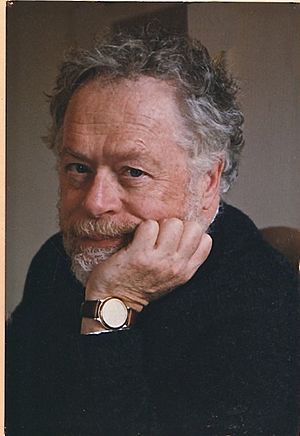Frank R. Parker facts for kids
Frank Ruff Parker III (born May 11, 1940 – died July 10, 1997) was an American lawyer who worked to protect civil rights and voting rights. Civil rights are the basic rights that all people should have, like freedom and equal treatment. Voting rights mean that all citizens have the right to vote. Starting in 1981, Frank Parker worked for an organization called The Lawyers' Committee for Civil Rights Under Law. He led their Voting Rights Project.
Through his work, he helped the United States Congress extend the Voting Rights Act of 1965 for 25 more years. This law helps make sure everyone can vote, no matter their race. For 12 years, he worked to make sure the Voting Rights Act was followed across the country. He did this by going to court and by teaching people about their rights. He also helped pass the National Voter Registration Act of 1993, which made it easier for people to register to vote. In 1990, he wrote a book called Black Votes Count: Political Empowerment in Mississippi After 1965. This book won awards and showed how the Voting Rights Act changed voting in Mississippi.
Contents
Early Life and Education
Frank Parker was born on May 11, 1940, in Mount Pleasant, Pennsylvania. His parents were Marjorie LeClair Parker and Frank R. Parker Jr. He went to public schools in Steubenville, Ohio. He then studied at Oberlin College. After that, he studied at Oxford University in England. He later went to Harvard Law School and became a lawyer in 1966.
Frank Parker was married three times and had four children: Barbara Parker Thornton, Stephanie Parker Weaver, Kevin Parker, and Ian Parker.
Fighting for Voting Rights
Frank Parker started his legal career in 1966. He worked for the United States Commission on Civil Rights. In 1968, he moved to Jackson, Mississippi. There, he worked for the Jackson office of the Lawyers' Committee for Civil Rights Under Law. This group helps people who have faced unfair treatment. He became the main lawyer for the office in 1976. He handled many court cases about voting rights and unfair hiring practices in Mississippi.
Making History in Court
Frank Parker was the lead lawyer or helped lead several very important court cases. These cases changed laws and helped many people.
- One case was called Brooks v. Winter. This case led to the creation of a new voting district where most people were Black. In 1986, Mike Espy was elected from this district. He was the first Black person from Mississippi to be in Congress since the time after the Civil War.
- Another case was Connor v. Finch. Because of this case, four Black lawmakers were elected to the Mississippi Legislature in 1975. By 1979, a total of 17 Black lawmakers were elected across the state.
Standing Up for Fair Education
In 1978, Frank Parker took over a case called Loewen et al. v. Turnipseed et al.. This case was about a textbook called Mississippi: Conflict and Change. The state of Mississippi did not want this book used in ninth-grade history classes. Frank Parker helped win this case. This victory is seen as important for Americans' right to read and have access to different ideas.
In 1979, a big flood damaged Jackson Academy. This was a private school that only allowed white students. After the flood, the school started holding classes in churches. Frank Parker filed a lawsuit. He argued that these churches should not get tax breaks if they were helping a school that separated students by race. Because of his lawsuit, Jackson Academy had to leave the churches. Frank Parker received many threats because of this case. He even had to leave Mississippi for a few weeks for his safety.
Later Career and Legacy
From 1975 to 1976, Frank Parker taught political science at Tougaloo College. In 1981, he moved back to Washington, D.C.. He continued to work as the voting rights director for the Lawyers' Committee for Civil Rights Under Law until 1993. He was a key leader in getting the "motor-voter" law passed. This law made it easier for people to register to vote when they got their driver's license.
After that, he taught law at the District of Columbia School of Law from 1993 to 1995. He also taught at American University in 1996. Later, he became a visiting professor at Washington and Lee University in Lexington, Virginia, where he taught about the U.S. Constitution. When he passed away on July 10, 1997, he had just accepted a job to teach law at the University of Pittsburgh.
Awards and Recognition
Frank Parker's book, Black Votes Count, won many awards in 1991. These included:
- The Silver Gavel Award from the American Bar Association
- The Ralph J. Bunche Award from the American Political Science Association
- The V. O. Key Award from the Southern Political Science Association
- The McLemore Prize from the Mississippi Historical Society
- The Gustavus Myers Outstanding Book Award from the Gustavus Myers Center for the Study of Human Rights
He also received other honors, such as an Honorary Black Man of the Year Award in 1970. In 1974, he received the Martin Luther King-John F. Kennedy Award from the Mississippi Council on Human Relations. In 1975, he received the Jackson Branch NAACP Freedom Award.
Frank Parker passed away on July 10, 1997, due to problems from a ruptured aortic aneurysm, which is a serious medical condition.
 | Claudette Colvin |
 | Myrlie Evers-Williams |
 | Alberta Odell Jones |


